【精品学案】2016最新高中人教版必修五英语学案《B5 U4-1 warming up》
- 格式:doc
- 大小:95.00 KB
- 文档页数:3
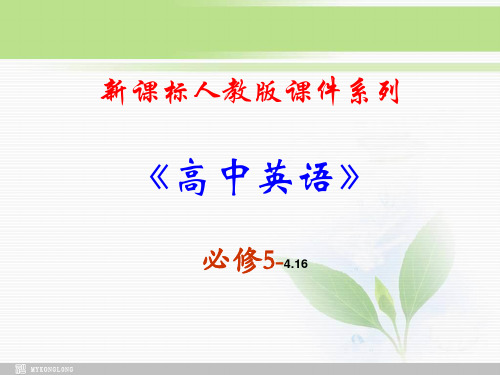
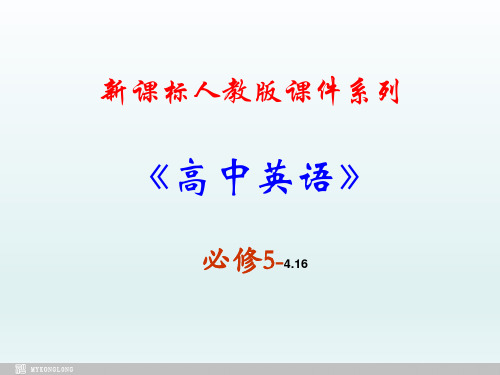
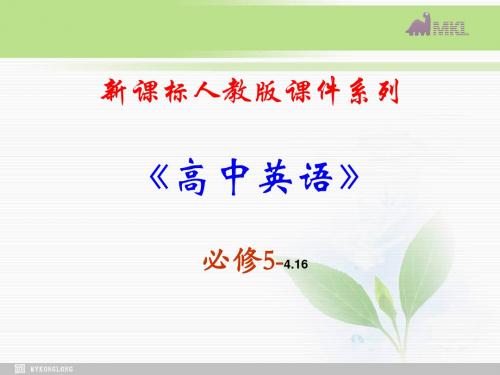

高中英语必修5教案-Unit1人教版高中英语必修5教案Unit 1 Great scientistsPeriod 1 Warming up and readingLearning aims:1. To help students learn to describe people2. To help students learn to read a narration about John Snow3. To help students better understand “Great scientists”Important Points:T o help students learn to read a narration about John Snow Difficult Points:T o help students learn to describe peopleTeaching Procedures:Ⅰ. Warming upStep I Lead inTalk about scientist.T: Hi, morning, class. Nice to see you on this special day, the day when you become a senior two grader. I am happy to be with you helping you with your English. Today we are to read about a certain scientist. But first le t’s define the word “scientist”. What is a scientist?A scientist is a person who works in science, trying to understand how the universe or other things work.Scientists can work in different areas of science. Here are some examples: Those that study physics are physicists. Those that study chemistry are chemists. Those that study biology are biologists.Step II BrainstormingAsk the students to try the quiz and find out who knows the most.T: There are some great scientific achievements that have changed the world. Can you name some of them? What kind of role do they play in the field of science? Do these achievements have anything in common? Match the inventions with their inventors.II. Pre-readingGet the students to discuss the questions on page 1 with their partners. Then ask the students to report their work. Encourage the students to express their different opinions.1.What do you know about infectious diseases?2.What do you know about cholera?3. Do you know how to prove a new idea in scientific research?III. ReadingStep I Pre-reading1.Do you know John Snow?2.Do you know what kind of disease is cholera?Let’s get to know how Dr. John Snow defeated “King Cholera” in 1854 in London in this reading passage:Step II SkimmingRead the passage and answer the questions.1.Who defeats “King Cholera“? (John Snow)2.What happened in 1854? (Cholera outbreak hit London.)3.How many people died in 10 days? (500)4.Why is there no death at No. 20 and 21 Broad Street as well as at No. 8 and 9Cambridge Street?(These families had not drunk the water from the Broad Street pump.)(Optional)Skim the passage and find the information to complete theform below.Who WhenWhat How ResultJohn Snow 1854 helpingordinarypeopleexposed tocholeraExamining the sourceof all water suppliesand finding newmethods of dealingwith polluted waster“King Cholera”defeatedStep III ScanningRead the passage and number these events in the order that they happened.2 John Snow began to test two theories.1 An outbreak of cholera hit London in 1854.4 John Snow marked the deaths on a map.7 He announced that the water carried the disease.3 John Snow investigated two streets where the outbreak was very severe.8 King Cholera was defeated.5 He found that most of the deaths were near a water pump.6 He had the handle removed from the water pump.Step IV Main idea and correct stageRead the passage and put the correct stages into the readingabout research into a disease.John Snow Defeats “King Cholera”ParagraphStages General ideas1 Find a problem:What cause the cholera?The causes of cholera2 Make up a question:Which is right?The correct or possible theory3 Think of a method:Test two theoryCollect data on where people were ill anddied and where they got their water4 Collect results:Mark the deathPlot information on a map to find outwhere people died or did not die5 Analyze the results:Find the resource of thewaterLook into the water to see if that is thecause of the illness6 Find supporting evidence Find other evidences to confirm hisconclusion7 Draw a conclusion The polluted dirty source of drinkingwater was to blame for the cause of theLondon choleraStep V Group discussionAnswer the questions (Finish exercise 2 on Page 3)1. John Snow believed Idea 2 was right. How did he finally prove it?(John Snow finally proved his idea because he found an outbreak that was clearly related to cholera, collected information and was able to tie cases outside the area to the polluted water.)2. Do you think John Snow would have solved this problem without the map?(No. The map helped John Snow organize his ideas. He was able to identify those households that had had many deaths and check their water-drinking habits. He identified those houses that had had no deaths and surveyed their drinking habits. The evidence clearly pointed to the polluted water being the cause.)3. Cholera is a 19th century disease. What disease do you think is similar to cholera today?(Two diseases, which are similar today, are SARS and AIDS because they are both serious, have an unknown cause and need public health care to solve them.) Step VI SummaryUsing the stages for scientific research and write a summary.Period 2&3 Language focusLearning aims: To help students learn to use some important words and expressions Important Points:To help students learn to remember some important words and expressions Difficult Points: To help students learn to use some important words and expressions Teaching Procedures:Step I Warming up1.characteristic①n. a quality or feature of sth. or someone that is typical ofthem and easy torecongnize.特征;特性What characteristics distinguish the Americans from the Canadians.② a. very typical of a particular thing or of someone’s characer 典型性的,Such bluntness is characteristic of him.Windy days are characteristic of March.[辨析]characteristic与charactercharacteristic是可数名词,意为“与众不同的特征“character表示(个人、集体、民族特有的)“性格、品质”,还意为“人物;文字”What you know about him isn’t his real character.2. put forward: to state an idea or opinion, or to suggest a plan or person, for other people to consider提出He put forward a new theory.The foreigners have put forward a proposal for a joint venture.An interesting suggestion for measuring the atmosphere around Mars has been put forward.☆ put on穿上;戴上;增加put out熄灭(灯);扑灭(火) put up with…忍受put down写下来;放下; put off 耽误; 延期put up建立; 建造, put up举起,搭建,粘贴3. analyze: to examine or think about something carefully in order to understand it vt.分析结果、检讨、细察A computer analyses the photographs sent by the satellite.The earthquake expert tried to analyze the cause of the earthquake occurred on May 12,2008.Let’s analyze the problem and see what went wrong.He analyzed the food and found that it contained poison.We must try to analyze the causes of the strike.☆ analy sis n.分析,解析,分解4. conclude: decide that sth. is true after considering al the information you have 得出结论;推论出to end sth. such as a meeting or speech by doing or saying one final thing vt. & vi结束,终止;We concluded the meeting at 8 o’clock with a pr ayer.From his appearance we may safely conclude that he is a heavy smoker.What do you conclude from these facts?We conclude to go out / that we would go out.conclusion n.结论arrive at a conclusion; come to a conclusion; draw a conclusion; reach a conclusionWhat conclusion did you come to / reach / draw / arrive at?From these facts we can draw some conclusions about how the pyramids were built.Step 2 Reading1. defeat① vt. to win a victory over someone in a war, competition, game etc.打败,战胜,使受挫I’ve tried to solv e the problem, but it defeats me!Our team defeated theirs in the game.② n.失败,输failure to win or succeedThis means admitting defeat.They have got six victories and two defeats.[辨析]win, beat与defeat①win “赢得”赛事、战事、某物;后接人时,意为“争取赢得…的好感或支持;说服”②beat “战胜”“击败”比赛中的对手,可与defeat互换We beat / defeated their team by 10 scores.They won the battle but lost many men.The local ball team won the state championship by beating / defeating all the other teams.I can easily beat /defeat him at golf.He is training hard to win the race and realize his dream of becoming a champion at the 2008 Olympic Games.2. expert① n. someone who has a special skill or special knowledge of a subject专家,能手an expert in psychology an agricultural expert② a. having special skill or special knowledge of a subject熟练的,有专门技术的an expert rider an expert job需专门知识的工作He is expert in / at cooking.3. attend vt. &vi 参加,注意,照料① be present at参加attend a ceremony / lecture / a movie / school / class / a meetingI shall be attending the meeting.Please let me know if you are unable to attend the conference.② attend to (on): to look after, care for, serve伺候, 照顾,看护The queen had a good doctor attending on her.Dr Smith attended her in hospital. 治疗Are you being attended to?接待Mother had to attend to her sick son.③ attend to处理,注意倾听attend to the matterA nurse attends to his needs.Can you attend to the matter immediately?I may be late – I have got one or two things to attend to.Excuse me, but I have an urgent matter to attend to.[辨析]attend, join, join in与take part in①attend指参加会议、上课、上学、听报告等②join 指加入某组织、团体,成为其中一员③join in指加入某种活动;表示与某人一起做某事join sb. in sth.④take part in指参加正式的、有组织的活动,切在活动中起积极作用Only 2 people attended the meeting.He joined the Communist Youth League in 2007.Will you join us in the game?We often tale part in the after-class activities.4. expose : to show sth. that is usually covered暴露expose sth. to the light of day 把某事暴露于光天化日之下I threatened to expose him ( to the police). 我威胁要(向警察)揭发他.He exposed his skin to the sun.他把皮肤暴露在阳光下.The old man was left exposed to wind and rain.When he smiled he exposed a set of perfect white teeth.5. cure vt. & n. to make someone who is ill well agian治疗,痊愈When I left the hospital I was completely cured.①cure sb of a diseaseWhen you have a pain in your shoulders, you will go to see a doctor. The doctor will cure you.The only way to cure backache is to rest.He will cure the pain in your shouldersWhen I left the hospital I was completely cured.The illness cannot be cured easily.Although the boy was beyond cure, his parents tried to cure him of bad habits.②a cure for a diseaseAspirin is said to be a wonderful cure for the pain.There is still no cure for the common cold.Is there a certain cure for cancer yet?③a cure for sth.: to remove a problem, or improve a bad situation解决问题,改善困境The prices are going up every day, but there is no cure for rising prices.[辨析]cure与treat①cure主要指痊愈,强调的是结果②treat强调治疗过程,指通过药物、特别的食品或运动治疗病人或疾病,不强调结果。
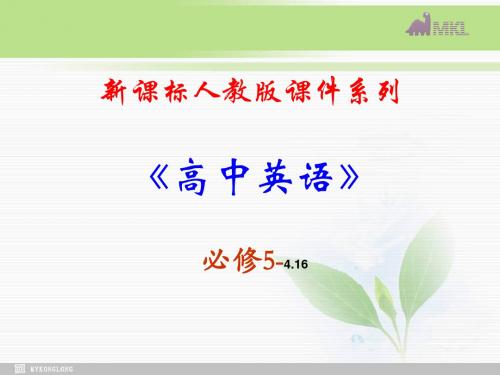
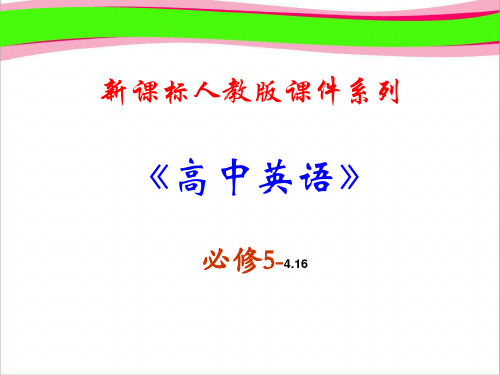
Unit 4Making the news媒体的发展历程The de v elopment of mediaNewspapers·The printed newspaper first appeared in 1450 in Europe.·The daily was published for the first time in 1650.·Ne w s of Frankfort (《法兰克福新闻》) published in 1615 is regarded as the first “real newspaper”.·Wai zhong xin bao (《外中新报》) was the first published Chinese newspaper in 1858. It was established in Hong Kong.TVJohn Logie Baird, the Scottish inventor, obtained the world's first real television picture in his laboratory in October, 1925, and showed it to the British public on January 26, 1926. He is remembered as the father of mechanical (机械式) television.Websites·The story of the Internet begins in the late 1950s. The Pentagon set up a research team in 1958 to create a computer network to operate during disasters like a nuclear war.·In 1985, the National Science Foundation created a network which provided a free national service to any US research and education institution. All those networks finally joined the Pentagon's network to form the Internet.·In the 1990s, anyone with a computer, a modern, and Internet software could link up to the Internet.开启快乐学习之旅纵观媒体发展史,媒体的发展历经5个阶段。
班级:_________ 姓名:_________ 小组号:________ 小组评价:______ 教师评价:________ Unit 4 Making the news Period 1 Warming-up Learning aim: Learn some basic knowledge about how to be a reporter and how to make the news. Important point: Develop the ability of speaking and discussing. Difficult point: Grasp some important information about the news. 【使用说明及学法指导】 1. 自学课本Unit4 (P25),完成预习案;2. 完成时间25分钟 预习案 Previewing Case Task1. Questions for thinking. How do you know what is happening around us or even abroad? ________________________________________________________________________________________________________________________________________________________________ Task2. Translate the following words and phrases. There are many kinds of jobs that are involved in a newspaper? What are they? 1. 记者___________________ 2. 编辑________________ 3. 摄影者_______________ 4. 设计师者____________ 5. 印刷者______________ 6. deputy editor_______________ 7. critic_________________ 8. chief editor ____________________ Task3. Match the following descriptions with the jobs given above. 1. This kind of job involves making sure the writing is clear, concise and accurate; checks facts. ( ) 2. This job is about interviewing people or finds out about events from onlookers. ( ) 3. This job mainly lays out the article and photographs. ( ) 4. This job mainly deals with taking photographs of important people or events. ( ) 5. This job needs to print the newspaper. ( ) Task4. How to make a newspaper? Put the following statements into correct order. A. Editors check the facts B. Designers design (lay out) the article C. Reporters interview people or find out the events D. Photographers take photographs E. Printers print the newspaper Correct order: ( ) Task5. Do you think what qualities a good news reporter needs to have? (Finish Exercise 1 in the pre-reading part on Textbook P25.) ________________________________________________________________________________________________________________________________________________________________ ________________________________________________________________________________________________________________________________________________________________ ________________________________________________________________________________________________________________________________________________________________
探究案 Exploring Case 探究一 Listening Task1. Listen to Part 1 of the tape and answer the following questions. 1. Q: 为什么Greg 必须去广播电台,而不用他自家的电话? ________________________________________________________________________________________________________________________________________________________________
2. Q: Greg 是怎样描述房子的窗户的?这表明了什么? ________________________________________________________________________________________________________________________________________________________________________________________________________________________________________________ Task2. Listen to Part 2 of the tape and fill in the blanks below. 1. ①___________________ just at that moment a man ②________________ and opened the ______________ for me. As soon as I entered the room, the ④_______________ from the “Today” programme. 2. Never was I relieved to see anyone! I really ⑤_____________ I was going to miss the programme. But ⑥_____________ I was on the ⑦____________ everything was fine.
探究二 Discussing Do you still remember your first day at school? Primary school? Middle school? Or high school? Exchange your experience with your partner. ________________________________________________________________________________________________________________________________________________________________________________________________________________________________________________________________________________________________________________________________________________________________________________________________________________ 训练案: 一.根据句意及首字母提示填写单词。 1. When you think about your future o________________, do you want to work for a newspaper? 2. What are the qualities a good news r________________ needs to have? 3. If you are o_______________ a chance, you should try your best. 4. The job of reporter i_________________ interviewing people. 5. A good writer needs to have good ___________________ (imagine). 6. Everyone has _________________ (forget) moments in his/her life. 7. He still has e_________________ for doing things though he is old.